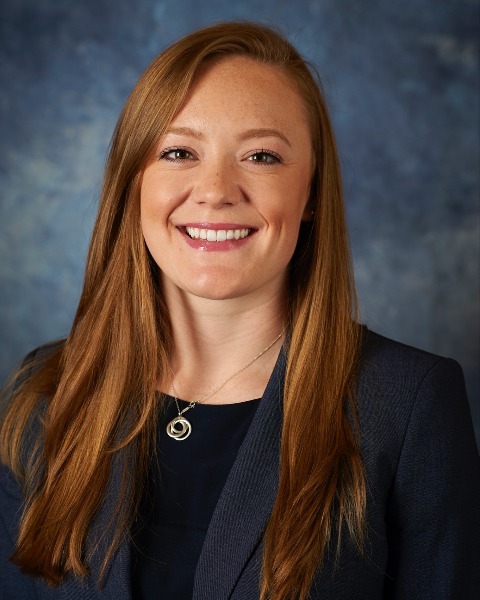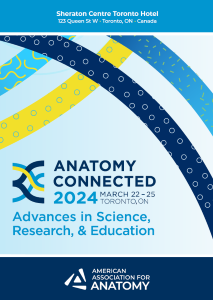Anatomy Education Posters
Poster: Anatomy Education Posters
88 - Confidence Crossroads: Unmasking Metacognitive Challenges in First-year Medical Students
Sunday, March 24, 2024
5:00pm - 7:00pm US EDT
Location: Sheraton Hall
Poster Board Number: 88
There are separate poster presentation times for odd and even posters.
Odd poster #s – first hour
Even poster #s – second hour
Co-authors:
There are separate poster presentation times for odd and even posters.
Odd poster #s – first hour
Even poster #s – second hour
Co-authors:
John Thompson, PhD - Neurosurgery and Neurology - University of Colorado School of Medicine; Lisa Lee, PhD - Cell and Developmental Biology - University of Colorado School of Medicine

Briauna B. Johnson, M.S.
Instructor
University of Colorado School of Medicine
Denver, Colorado, United States
Presenting Author(s)
Abstract Body : Background:
Metacognition is vital for medical students to acquire professional competencies, yet most curricula lack deliberate metacognitive training. This study evaluated the outcomes of a Metacognition workshop (MW) early in medical school where students engaged in self-awareness exercises on quiz performance and emotional status.
Materials and Methods:
The MW was conducted in the third week of the first course for the medical school classes of 2026 and 2027 (n=344 total). Students reflected on their prior week’s quiz experience and reported in PollEverywhere their confidence levels before and after quiz, emotional states, subsequent course engagement, and compared their predicted vs. actual scores. In an IRB-exempt study, matched quantitative datasets from the MW and correlation with quiz scores were completed with a paired T-test and Pearson’s correlation test, respectively. Thematic analyses examined open-ended responses gauging students’ self-awareness of emotional states and engagement with two subsequent classes, first on humanities then the quiz review.
Results:
Complete matched MW responses from 47% (n=163) of two medical classes were included in the quantitative analyses. Both cohorts had decreased confidence levels after completing the quiz (p< 0.001, Cohen’s d=0.45). Correlation test revealed students’ inability to accurately predict exam outcomes (r = -0.45; p =1.22e-8). Interestingly, 72% of high performers underpredicted their quiz outcomes whereas, low performers did not show a clear trend. Qualitative analyses revealed 15% and 45% of students in each cohort (n=130, 87) reported an inability to focus on the humanities class immediately after the quiz due to emotional distress, performance anxiety, and burnout. Over 90% of respondents in each cohort (n=133, 109) reported high engagement in the quiz review class after the humanities due to teamwork, quiz item debates, and identifying missed items.
Conclusion:
New medical students exhibit low self-awareness in learning and assessment outcomes with more students having higher confidence before the quiz that significantly declines after. High performers tend to underpredict while the low performers do not show a trend, both indicative of poor metacognitive skills. MW guided students to recognize these discrepancies and the impact of their emotional states on subsequent class engagement.
Significance/Implication:
This study emphasizes the need for a deliberate metacognitive curricular component in medical curricula that guides students to practice self-awareness in the tangible context of learning that may be applied to other competencies in the future. The long-term effect of MW on self-directed learning and other competencies will be investigated in the future.
Metacognition is vital for medical students to acquire professional competencies, yet most curricula lack deliberate metacognitive training. This study evaluated the outcomes of a Metacognition workshop (MW) early in medical school where students engaged in self-awareness exercises on quiz performance and emotional status.
Materials and Methods:
The MW was conducted in the third week of the first course for the medical school classes of 2026 and 2027 (n=344 total). Students reflected on their prior week’s quiz experience and reported in PollEverywhere their confidence levels before and after quiz, emotional states, subsequent course engagement, and compared their predicted vs. actual scores. In an IRB-exempt study, matched quantitative datasets from the MW and correlation with quiz scores were completed with a paired T-test and Pearson’s correlation test, respectively. Thematic analyses examined open-ended responses gauging students’ self-awareness of emotional states and engagement with two subsequent classes, first on humanities then the quiz review.
Results:
Complete matched MW responses from 47% (n=163) of two medical classes were included in the quantitative analyses. Both cohorts had decreased confidence levels after completing the quiz (p< 0.001, Cohen’s d=0.45). Correlation test revealed students’ inability to accurately predict exam outcomes (r = -0.45; p =1.22e-8). Interestingly, 72% of high performers underpredicted their quiz outcomes whereas, low performers did not show a clear trend. Qualitative analyses revealed 15% and 45% of students in each cohort (n=130, 87) reported an inability to focus on the humanities class immediately after the quiz due to emotional distress, performance anxiety, and burnout. Over 90% of respondents in each cohort (n=133, 109) reported high engagement in the quiz review class after the humanities due to teamwork, quiz item debates, and identifying missed items.
Conclusion:
New medical students exhibit low self-awareness in learning and assessment outcomes with more students having higher confidence before the quiz that significantly declines after. High performers tend to underpredict while the low performers do not show a trend, both indicative of poor metacognitive skills. MW guided students to recognize these discrepancies and the impact of their emotional states on subsequent class engagement.
Significance/Implication:
This study emphasizes the need for a deliberate metacognitive curricular component in medical curricula that guides students to practice self-awareness in the tangible context of learning that may be applied to other competencies in the future. The long-term effect of MW on self-directed learning and other competencies will be investigated in the future.

